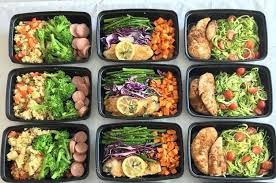Clean eating is an idea that eating whole foods in their most natural state is good for our body because it offers certain benefits and to avoid processed foods such as refined sugar, refined oil etc. There are variations in the clean eating diet which excludes gluten, grains, milk and dairy products. It advocates the consumption of raw food. The principals of clean eating are: eat for nourishment, eat regular balanced meals and healthy snacks that are nourishing and not too rushed. Eat at home more often and prepare food in healthy ways. Pack food to eat away from home when on the road, at work or at activities. When you do eat out, choose wisely. Eat more plant-based foods. Ramp up on plants by eating more plant-based proteins, such as beans, lentils and peas, and high-protein whole grains, like quinoa, barley and buckwheat.
But, regardless of being discussed nearly everywhere, and by many, clean eating has no specific definition. Normally, it means avoiding packaged and processed foods and eating food as close to its natural state as possible. This doesn’t mean that all food must be eaten raw. Characteristics of clean food generally include: home cooked, basic, whole ingredients, no preservatives, no food coloring, or other additives and minimal processing.
I have seen many of my young students, and many of my upmarket friends falling prey to the clean eating concept. In my opinion, it is an overriding concern for parents and the dieters themselves. The idea of weight loss and obsession of eating healthy is killing. Most of the clean eating people look weak and pale. They literally need to drag themselves; they are left with no energy. They can’t walk up the flight of stairs. The muscle mass reduces in legs, shoulder, head and hand. They are left with no energy. After few days of clean eating they are left with no enthusiasm.
Many are depressed: They complain of being tired all the time, they struggle to concentrate because the brain does not support on grasping. The brain requires a steady supply of glucose to function properly and the diet deprives it for some time. Their body is so desperate for nutrition — especially carbohydrates which binges for a high-calorie, sugary foods as a last-ditch attempt to keep the brain going. But, after having a good sugar rich food, they feel guilty because they have broken their ‘clean eating’ habit.
The problem is that clean eating is not plainly defined: it’s vague in nature. Primarily, it became famous for eating more whole, nutritious foods. But, as days passed, it’s just not about eating better; it is a privilege of consuming nicely packaged foods with influencer-approved ingredients many of which do not reap the claimed benefits. We can’t ignore that clean eating is for those who have access and can afford to shop at upscale grocery stores or fresh farmers markets.
It implies a weird lifestyle: Some proponents of clean eating have an air of superiority; I don’t know when eating style started defining your worth? Plus, the pressure to eat clean can cause anxiety or excessive fixation, too many restrictions around eating. Eating clean unfortunately becomes a competition of who can have the best-looking food or the cleanest list of ingredients. The fact is that most food has been processed in some way, because washing and cutting are technically a way of processing, and there are several processed foods that are used in preparations; nutritious like peanut butter, whole wheat pasta and canned beans.
Make meaningful associations with healthy food: A former commissioner of the U.S. Food and Drug Administration says that training yourself to stop craving salty, sugary, and fatty foods can’t be a cognitive process alone. If your emotions do not accept depriving your body of salty, sugary food do not torture it, instead listen to your body. Emotions play a huge role in our eating habits. That’s where your imagination comes in. Many of us connect positive, nostalgic feelings with unhealthy foods.
Each one has unique food needs: Each person’s daily intake of food is different. Each diet is quite diverse, and therefore ‘’one size fits all’’ is wrong notion. It is simply not possible. Each person’s dietary intake is macronutrient balanced by his body. This being the fact, all of the main meals through the day have a balance of complex carbohydrates, protein and fats. It need not be overly controlled.
To conclude, all extremes and restrictive practices of clean eating only lead to disordered eating patterns. I call it just a damaging obsession.














































